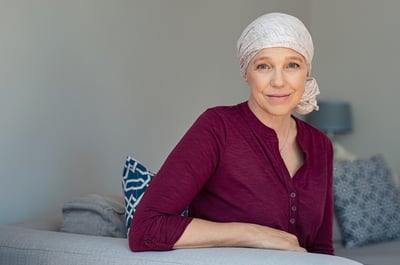Detrás de los titulares sobre el cáncer
Obtener más información sobre el programa de XRAY



Relevancia: Alta
Este artículo es de mayor interés para: Personas con cáncer de mama, colorrectal o pulmonar.
Estudio: La ampliación del acceso a la cobertura de Medicaid estipulada en la Ley sobre la atención médica asequible está vinculada con la reducción de la mortalidad por cáncer
En 2014, la Ley sobre la atención médica asequible estipuló la ampliación de la cobertura de Medicaid. ¿Cómo afectó esto a los servicios de atención médica para los pacientes con cáncer? El presente estudio muestra que en los estados que ampliaron la cobertura de Medicaid se observó una reducción en las muertes por cáncer de mama, colorrectal y pulmonar en comparación con los estados que no ampliaron la cobertura. El diagnóstico temprano del cáncer está relacionado con bajos niveles de mortalidad. Estos datos indican que aumentar el acceso a la atención médica resultaría en un diagnóstico temprano del cáncer y mejores resultados, incluso en bajos niveles de mortalidad. (publicado el 31/3/21)
Leer más ›


Relevancia: Alta
Este artículo es de mayor interés para: Personas que consideren hacerse una mamografía después de vacunarse contra el COVID-19.
Directrices: El mejor momento para realizarse mamografías después de recibir la vacuna contra el COVID-19
Las vacunas contra el COVID-19 ayudan al sistema inmune a destruir el virus. Los ganglios linfáticos son un elemento importante del sistema inmune. Las vacunas contra el COVID-19 pueden provocar inflamación temporal en algunos ganglios linfáticos, lo cual puede suscitar sospechas en una mamografía. La Sociedad de Imagenología Mamaria (Society for Breast Imaging, SBI) y otras organizaciones profesionales han divulgado recomendaciones sobre el momento adecuado para realizarse mamografías después de haberse vacunado contra el COVID-19. (publicado el 30/3/21)
Leer más ›


Relevancia: Media-alta
Este artículo es de mayor interés para: Mujeres que están considerando una mastectomía sin reconstrucción del seno.
Estudio: Respuestas de pacientes y sus experiencias de “quedarse planas”
Algunas pacientes con cáncer de mama en fase inicial, o aquellas que están considerando una cirugía para reducir el riesgo pueden preferir una mastectomía sin reconstrucción, a lo cual suelen referirse como “quedar planas”. Los resultados de este estudio indican que los cirujanos desempeñan un papel central en esta decisión (publicado el 23/3/21).
Leer más ›


Relevancia: Media-alta
Este artículo es de mayor interés para: Personas con riesgo de padecer cáncer colorrectal o de ovario
Estudio: Forma en la que el índice de masa corporal (IMC) puede afectar el efecto favorable del consumo de aspirina en la protección contra el cáncer colorrectal y de ovario
En este estudio se analizó el efecto del consumo diario de aspirina en la disminución del riesgo de padecer distintos tipos de cáncer y si la disminución del riesgo depende de los factores de riesgo de padecer cáncer tales como obesidad, consumo de tabaco, inactividad física o los antecedentes familiares de cáncer. (publicado en el 19/2021)
Leer más ›


Relevancia: Media-alta
Este artículo es de mayor interés para: Mujeres con cáncer de mama
Estudio: ¿Pueden las pruebas de diagnóstico identificar a más pacientes con cáncer de mama que pueden omitir la quimioterapia sin correr riesgos?
En dos estudios que se presentaron en el Simposio sobre cáncer de mama en San Antonio en diciembre de 2020 se analizó la manera en que las pruebas de diagnóstico pueden identificar a las pacientes que tienen mayor o menor probabilidad de beneficiarse de la quimioterapia. (publicado 4/3/21)
Leer más ›


Relevancia: Alta
Este artículo es de mayor interés para: Hombres con cáncer de próstata avanzado
Actualización: La FDA aprueba Orgovyx, la primera hormonoterapia por vía oral en su tipo, para tratar el cáncer de próstata avanzado
En diciembre de 2020, la FDA aprobó Orgovyx para tratar el cáncer de próstata avanzado. Los resultados se basaron en el estudio clínico HERO en el que participaron más de 900 hombres. Los datos de este estudio mostraron que este nuevo tratamiento era más seguro que el tratamiento de privación de andrógenos para hombres con cáncer de próstata avanzado y riesgo de enfermedad cardiovascular. (Publicado 18/2/21)
Leer más ›


Relevancia: Media-alta
Este artículo es de mayor interés para: Mujeres con mutaciones hereditarias en el BRCA1 o en el BRCA2
Estudio: La lactancia materna como factor para disminuir el riesgo de cáncer de ovario en mujeres con mutaciones en el BRCA
La información obtenida de un estudio a gran escala señala que la lactancia materna puede ser un factor de protección contra el cáncer de ovario en mujeres con mutaciones hereditarias en el BRCA1 o en el BRCA2. (publicado el 28/01/21)
Leer más ›


Relevancia: Media-alta
Este artículo es de mayor interés para: Pacientes con cáncer de mama que consideran someterse a hormonoterapia.
Estudio: Cuál es la experiencia que tienen los pacientes que padecen cáncer de mama con la hormonoterapia
Los efectos secundarios derivados de la hormonoterapia son el motivo recurrente por el que muchas mujeres y hombres con cáncer de mama con receptores hormonales positivos suspenden prematuramente el tratamiento. Algunas personas deciden nunca someterse a la hormonoterapia. En este estudio se les preguntó a los pacientes acerca de sus experiencias con la hormonoterapia (o endocrinoterapia). Los resultados indican que hay formas para aumentar la cantidad de pacientes que cumplen con el tratamiento. Los pacientes necesitan mejores formas para controlar los efectos secundarios relacionados con el tratamiento. (publicado el 19/01/21)
Leer más ›


Relevancia: Alta
Este artículo es de mayor interés para: Hombres con cáncer de próstata
Actualización: La FDA aprueba un nuevo medicamento para diagnóstico por imágenes para detectar la diseminación del cáncer de próstata
El 1 de diciembre de 2020, la FDA aprobó un nuevo tipo de tecnología de diagnóstico por imágenes para confirmar la diseminación del cáncer de próstata recién diagnosticado con sospecha de metástasis. Además, la aprobación incluyó el uso para confirmar la sospecha de recurrencia del cáncer en hombres que presentan un aumento en los niveles del antígeno prostático específico (PSA) después del tratamiento. La aprobación se basó en dos estudios clínicos que mostraron que esta nueva técnica es segura y congruente en la detección precisa del cáncer diseminado fuera de la glándula prostática. (Publicado 7/1/21)
ESTA INFORMACIÓN SE ACTUALIZÓ el 10/5/2022: el 23 de marzo de 2022, la Administración de Alimentos y Medicamentos de los EE.UU. (FDA, por sus siglas en inglés), aprobó un nuevo medicamento llamado Pluvicto para tratar a pacientes con cáncer de próstata metastásico resistente a la castración. EL mismo día, la FDA también aprobó un nuevo fármaco de diagnóstico por imagen llamado Locametz (una marca de Gallium 68 PSMA-11) para la identificación de aquellos pacientes que se beneficiarían del tratamiento con Pluvicto. Para conocer más información sobre la aprobación por parte de la FDA de Pluvicto y Locametz, haga clic aquí.
Leer más ›


Relevancia: Media
Este artículo es de mayor interés para: Personas con cáncer de seno
Actualización: Orientación más sólida sobre la seguridad de los implantes de seno
La FDA emitió una nueva guía para los implantes de seno para que todas las personas con implantes de seno tengan la información adecuada para comprender y tomar decisiones sobre su atención médica. Las características requeridas incluyen advertencia de recuadro, lista de verificación de decisiones del paciente, directrices para la detección de rupturas de implantes y tarjetas de dispositivo del paciente (publicado el 14/12/21).
Leer más ›